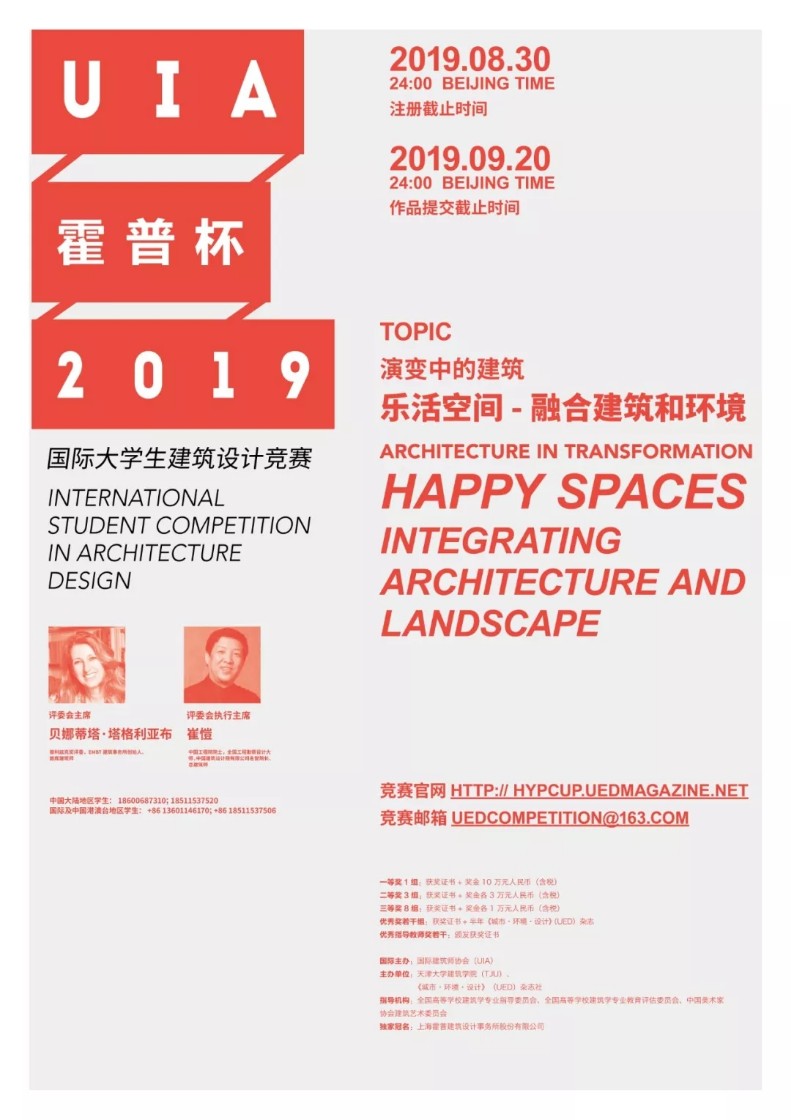2019UIA-霍普杯国际大学生建筑设计竞赛征集通告
期待已久的2019UIA-霍普杯国际大学生建筑设计竞赛题目新鲜出炉啦!Miralles Tagliabue EMBT创始人、普利兹克奖评委会成员贝娜蒂塔·塔格利亚布担任本次竞赛主席并拟定题目。

贝娜蒂塔·塔格利亚布
西班牙EMBT建筑事务所创始人
普利兹克奖评委会成员
竞赛题目
"乐活空间——融合建筑和环境"
HAPPY SPACES – INTEGRATING ARCHITECTURE AND LANDSCAPE

“ 竞赛背景 ”
建筑师能以积极的方式改变环境并影响人们的未来,他们可以创造“乐活空间”来为人们带来幸福感。在一个良好的环境中来实现这个目标会更加容易。当建筑与其周边环境紧密地联系在一起、建筑的内外边界变得模糊的时候,场地的所有积极因素都可以帮助建立建筑内部的美妙氛围。但真正的挑战在于,如何反其道而行之,通过建筑设计来为周边带来积极影响。
Architects can change people’s environment and influence their future in a positive way. They can create “happy spaces” that contribute to people’s well-being. Inserting a building in a nice environment makes this goal easier. When the building is linked to its surroundings,when the limits are blurred with the construction, all of the positive elements of the site can contribute to create this good feeling inside. But the real defy is how to do the opposite, how to influence in a positive way the surroundings through out the architecture?
在大城市,缺乏辨识度的地方有很多,它们往往与文化、历史和传统都割裂开来。我们将这些孤立的、未融合的地区称为“城市边缘地带”或者“城市衰退区”,比如那些社会矛盾尖锐或是贫困的社区。由于失败的规划或缺乏规划,这些地区通常是破碎的,急需重建。因此,建筑师的任务就是要去了解这些地区的特征,并为其创造独有的“场所精神”,通过挖掘消极区域内鼓舞人心并且吸引人的特质,完成消极空间向积极空间的转变,在一个“不快乐的环境”中设计和建造一个“快乐的建筑”,这样的创造被定义为“乐活空间”。
Big cities often contain places that lack identity and whose existences are hardly linked with culture, history or tradition. These places are so-called “periphery” or “degraded” areas that remained isolated andun-integrated, such as neighborhoods with social conflict or poverty. They are often damaged and in need of reconstruction due to lousy planning or no planning at all. The architects’ mission is, there fore, to recognize the character of the site and create its ‘sense of place’. This creation looks into the transforming of negative spaces into positive ones by bringing out its inspiring and attractive qualities – this is defined as “happy spaces”, by designing and building a “happy building” in an “unhappy environment”.
要达到这个目的,建筑应该与城市环境和周边景观和谐共生,与人和历史紧密联系。建筑不能脱离现状环境和重大历史事件。一座与周边环境相融合的建筑会形成一个有机体系,而其中对人的考虑无疑是不容忽视的,因为人性是所有体系的核心。
To that end, the building should be built in harmony with the urban context and its natural landscape, and should be in connection with people and history. Architecture can not be detached from the pre-existent context and significant past events. A building in relation to its context will form an organic system, and it is not possible to imagine such system without taking into consideration the people in it. This is significant as humanity is the heart of all systems.
除此之外,人类活动也应该作为这个体系的关键部分来考虑。因此,建筑师不仅要设计能够融合周边环境的建筑形式,还要提出与空间相对应的活动和功能。对于建筑师来说,能够从各个维度上对建成环境有全面的愿景是非常重要的。
In addition, human activities should also be considered as a key part of the system. There fore architects are expected to propose not only the form of the building in relation to its surroundings, but also the activities and the programs associated in the space. It is important that architects should have a comprehensive vision for the built environment inevery dimension.
所有这些考虑须以一种真正生态性的方法来落地实施。在建立一个人工生态系统时,具有可持续性的建筑干预是最为理想的,这种干预带来的好处还可以同时为周边社群带来积极影响。一个在各方面都负责的建筑干预绝不能仅仅考虑建筑内部的舒适性和使用者的身心健康,更要考虑到一个区域的整体改善。
These considerations need to be conducted with a real ecological approach. A sustainable intervention should always come first when creating an artificial ecosystem. In this way, the beneficial forces made by the new intervention can also affect the surrounding neighborhood positively. A responsible intervention in all aspects should take into consideration an improvement of one area and not solely the comfort and wellness inside one building.
因此,我们鼓励学生在更大的背景下思考建筑,从可持续性、社会性和历史的角度,把他们的建筑作品看作过去事物的总结以及改善未来的积极力量,把居住环境看作与城市其他区域、景观、气候、物理和社会背景相融合的人工生态系统。建筑师可以创造一个可持续的环境,改善人们的身心健康。
For these reasons we would like to ask students to think about a building in its wider context. From the perspective of sustainability, sociality and history, students are encouraged to place their architectural projects as consequence of the past and as a contribution to the future, thinking the inhabited areas as interrelated artificial ecosystems in harmony with the rest of the city, the landscape, the climate, the physical and social context. Architects can create a sustainable environment that could improve the health and well-being of the people.
“ 竞赛目的 ”
本次竞赛作为一个训练旨在帮助学生们理解:
- 如何将建筑及其所处环境作为一个综合性系统来设计;
- 如何通过建筑干预来改善一个地区;
- 如何融合建筑的内部和外部,以及融合建筑和周边景观;
- 理解场地及背景分析的重要性;
- 如何在非积极环境中建造一座快乐的建筑;
竞赛会帮助参赛者学习如何思考一个建筑作品的社会责任性,如何用设计改善人们的生活。
The competition is conceived as an exercise to help students understand:
- How to plan a building and its environment as a comprehensive system.
- How to improve a place through an architectural intervention.
- How to integrate inside and outside; the building and the landscape.
- Understand the importance of analysis of the site and context.
- How to create a happy building in a less happy environment.
Providing a project experience which teaches students about the social responsibility of an architectural project and how it can change people’s life in a positive way.
“ 设计要求 ”
- 参赛者需选择一个衰退的城市或景观区域,倾向于城市边缘地带(世界任意地区)。 所选场地需包含建筑物及其周边环境,设计方案应作为一个整体考量。
衰退区域可以是城市中结构松散的区域,城市规划未涉及或没有产生积极影响的边角地区,未整合进城市/景观中的区域,或自发建造的街区。它们可以是相对封闭孤立的区域,也可以是困难的社区,或是社会矛盾尖锐的、贫困的、破碎的需要重建的地区等等。简而言之,它们是对大众或是投资者都缺乏吸引力的地方。
- 所选地址必须是真实存在的,参赛者应展示他们的设计将如何干预并提升所选建筑及周边环境的质量、价值、社会生活以及使用者的身心健康,并将其转化为有吸引力的空间。
- 建筑的周边环境可以选择不同的尺度,但需保证建筑物与周边环境的融合。参赛者应选定一个区域并与建筑物(建筑群)形成一个整体的生态系统。
- 参赛者可以对场地内的功能或活动类型进行提议,但它们应该是混合的(至少2种不同的功能),且这些用途和功能应涵盖建筑物本身以及周边环境。
- 建筑物规模可为4000㎡ 左右,但不局限于此。只要合理,任何尺度都是可行的。
- 设计方案应致力于改善当地的环境,为当地的居民带来益处。
- Participants can choose sites in a degraded urban/ landscape area, preferably at the periphery (anywhere in the world). The site shall include construction area and surrounding area of the building.The student proposal should become aunit that can be imagined as a whole.
* A degraded area can be for instance an urban unstructured area, residual zones where urban planning didn’t arrive or didn’t have a positive effect, areas that remained un-integrated in a city/landscape, self-constructed neighborhoods. They can be areas that remained isolated, can be difficult neighborhoods, areas with social conflict or poverty, areas that have been damaged and need reconstruction, etc.They are places that are not attractive for the people or investors.
- It is compulsory that the context is existing, and participants shall define how their intervention can improve the quality, the value, the social life, the wellness and transform it into an attractive one.
- The surrounding area can vary in dimensions, but it has to guarantee the integration of the building with the surroundings. The participants should include a surrounding area that can create an ecosystem together with the building/ buildings itself.
- Participants can propose types of program or activity, but they should be mixed (at least 2 different functions). They have to propose the uses and program for the construction and for the surrounding area as well.
- The construction can have around 4,000㎡ but it is not restricted to this dimension. Any dimension is possible if it is justified.
- The proposal shall have the intention to improve the environment and bring benefits to the people living there.
“ 评选标准 ”
- 建筑和周边环境的融合。
- 设计方案的可持续性。
- 设计所带来的社会效益以及对人们生活质量带来的提升。
- Integration of the building with the landscape/context.
- Sustainability of the proposal.
- The social benefits of the proposal and how it can improve people’s life.
2019霍普杯奖项设置
一等奖1组,获奖证书+奖金10万元人民币(含税);
二等奖3组,获奖证书+奖金各3万元人民币(含税);
三等奖8组,获奖证书+奖金各1万元人民币(含税);
优秀奖若干组,获奖证书+半年《城市·环境·设计》(UED)杂志;
优秀指导教师奖若干,颁发获奖证书
2019霍普杯组织机构
国际主办
国际建筑师协会(UIA)
主办单位
天津大学建筑学院
《城市·环境·设计》(UED)杂志社
指导机构
全国高等学校建筑学专业指导委员会
全国高等学校建筑学专业教育评估委员会
中国美术家协会建筑艺术委员会
独家冠名
上海霍普建筑设计事务所股份有限公司
协办单位
清华大学建筑学院
同济大学建筑与城市规划学院
东南大学建筑学院
华南理工大学建筑学院
西安建筑科技大学建筑学院
重庆大学建筑城规学院
哈尔滨工业大学建筑学院
“ 报名参赛 ”
评委会主席
贝娜蒂塔·塔格利亚布(Benedetta Tagliabue)
评委会执行主席
崔愷
报名截止时间
2019年8月30日(北京时间)
作品提交截止时间
2019年9月20日(北京时间)
竞赛提交邮箱
uedcompetition@163.com
竞赛的锣鼓已经敲响,来自国内外的评委大师已经准备就绪,你和小伙伴们还等什么,快快行动起来,登录霍普杯官方网站:http://hypcup.uedmagazine.net注册报名吧!
猜你喜欢
![]()